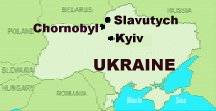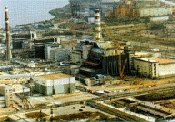Chornobyl Center for Nuclear Safety, Radioactive Waste and Radioecology
 |  |
The Chornobyl Center
 Chornobyl Nuclear Power Plant |
To focus these efforts, Ukraine established the Chornobyl Center for Nuclear Safety, Radioactive Waste and Radioecology. Ukrainian President Leonid Kuchma created the Center in 1996. The Center's primary technical branch, the Slavutych Laboratory for International Research and Technology, is 40 km northeast of the Chornobyl Nuclear Power Plant, in the city of Slavutych. Administrative offices are in Kyiv.
Objectives
Specialists at the Chornobyl Center are working with international agencies on joint projects in nuclear safety. The Center was established with the following objectives:
- Provide a means to address environmental and health issues for areas affected by the Chornobyl accident.
- Help to mitigate the socioeconomic impacts associated with the closure of the Chornobyl plant.
- Develop sustainable operational safety programs that support Ukrainian nuclear power plants.
- Help develop and maintain in-country expertise in the nuclear sciences.
- Address shutdown and deactivation, spent fuel, and waste management issues at Chornobyl and elsewhere in the Ukraine.
Establishment of the Center is a milestone in Ukraine's effort to build in-country expertise in safe nuclear power plant operations. Employment fostered by the Center is expected to reduce the socioeconomic impacts of the Chornobyl plant's permanent shutdown in the year 2000.
Multi-National Effort
International experts collaborate with Center specialists on nuclear safety analyses and projects. This cooperation accelerates Ukraine's dissemination and use of internationally accepted nuclear safety practices. Meanwhile, research at Chornobyl is advancing international experts' understanding of environmental management, enabling them to create improved technologies for use in Ukraine and elsewhere in the world.
The United States
The United States has worked with Ukraine to develop the Chornobyl Center's infrastructure. U.S. and Ukrainian technicians installed a satellite-based communications system at the Center's Slavutych facilities in 1996. Through that link, the Center has gained reliable telephone and data access to the rest of the world, along with videoconferencing capability. In November 1997, the Center's staff moved into a newly renovated building that includes computer stations, offices, classrooms, and conference rooms. The United States supplied office equipment and computer hardware and software. U.S. experts have provided training for the Center's managers and are working with them to establish effective management systems.
U.S. and Ukrainian specialists completed three joint technical projects in nuclear safety in 1997: 1) a risk analysis of hazards posed by the Unit 4 shelter to the operational Unit 3 reactor, 2) an assessment of computer modeling needs for work at the shelter, and 3) an assessment of robotics technology needs. More projects are under way. These include nuclear data acquisition and evaluation, an assessment of Ukraine's spent fuel management needs, and planning and analysis work for the shutdown and deactivation of the Chornobyl plant. The Pacific Northwest National Laboratory coordinates these efforts on behalf of the U.S. Department of Energy.
France and Germany
France and Germany have committed funds to support nuclear safety work in Ukraine. French and German specialists are working with Center personnel to compile a database on the safety status of the Chornobyl Shelter. The team also will study the ecological effects of the accident and its health effects on cleanup workers and the general public. Experts from Russia and Belarus will participate in the studies. A joint venture (called RISKAUDIT) of France's Institute de Protection et de Surete Nucleaire and Germany's Gesellschaft fur Anlangen und Reacktorsicherheit mbH is undertaking the work.
Great Britain
In October 1997, Great Britain signed a memorandum of understanding with Ukraine to support further development of the Center and to conduct joint technical projects. Discussions are under way to establish a scientific project agenda and communications program. The British Department of Trade and Industry coordinates work with the Center.
Italy
Italy intends to support joint technical projects, which will include modeling of contaminated aquatic systems; study of the public radiation exposure from the 1986 accident; studies of risk and exposure indicators, DNA radiation damage mechanisms, and post-accident thyroid problems in children; and training on nuclear waste characterization. Italy's National Agency for New Technology, Energy, and Environment coordinates Italy's work with the Center.
Other Countries
Japan and Canada are discussing joint technical projects with the Center.
Center Management
Dr. Valery N. Glygalo directs the Chornobyl Center, under appointment from the Ukrainian president. Mr. Anatoly V. Nosovsky, Dr. Glygalo's deputy, is director of the Slavutych Laboratory. A board of supervisors, composed of representatives of Ukrainian agencies, provides guidance.
For more information, please contact:
 Valery Glygalo, Coordinating Director
Valery Glygalo, Coordinating Director
Chornobyl Center
26 Lesya Ukrainka Blvd., Kyiv 252133, Ukraine
Phone / Fax: (380-44) 294-4379
 Anatoly Nosovsky, Director
Anatoly Nosovsky, Director
Slavutych Laboratory of International Research and Technology
7/1, Gvardeyskaya Diviziya str., Slavutych, Kyiv Region
Phone/Fax: (04479) 2-30-16